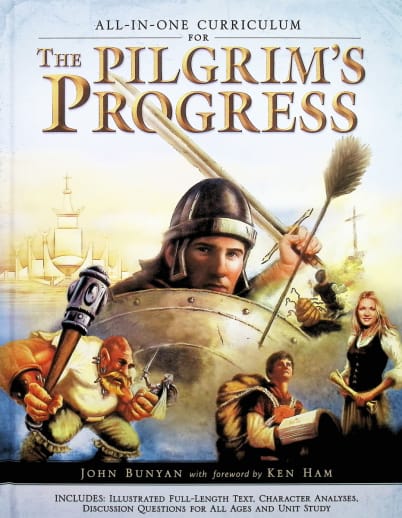All-In-One Curriculum for the Pilgrim's Progress
Product Overview
- New curriculum from Answers in Genesis
- A great devotional or unit study option
- Extension activities in history, science, and language arts included
- Follows a 13-week schedule
Description
Extension activities provide supplemental opportunities in history, science, and language arts to be used over a 13-week period. There are three lessons from Pilgrim’s Progress per week. You can adjust this to your schedule. Lesson plans are included for each week for how to incorporate these extra activities into the program. This would make a nice unit study! All Scripture quotations are taken from the KJV or NKJV. Hardcover, 492 pages. ~Amber
Preserving the tradition of families studying God’s Word together, Answers Bible Curriculum offers age-appropriate lessons that teach children the plan of salvation and the nature of God’s attributes. Through this in-depth study of Scripture, children are shown how to apply the Bible to their everyday lives and how to defend their faith.
Year 1 includes creation, the fall of man, the global flood, the judgment at Babel, and the lives of Abraham, Isaac, Jacob, and Joseph. Year 2 covers the birth of Moses through the Assyrian captivity of Israel. Students will read passages from Exodus through 2 Chronicles, Jonah, Amos, Hosea, Psalms, and Proverbs. Year 3 traces the history of Israel’s remnant through captivity until the promised Messiah. The ministry of Jesus, as well as His authority, is covered. It concludes with the feeding of the five thousand. Year 4 focuses on Jesus’s final year of ministry, practical lessons from the life of Jesus, the apostle’s teachings, Paul’s ministry, and the revelation of John of the new heavens and the new earth. The ESV Bible is utilized.
Essential for each year of study, the all-in-one Teacher Guides give parents everything they need to teach kindergarten through grade 5. Within its pages are detailed lessons and lesson summaries, key passages, suggested schedules, extension activities, discussion questions, memory verses, game suggestions, optional resources, and a Student Workbook overview. Lessons are divided into 36 weeks, at a pace of three days per week per lesson. Teaching time varies from 25-45 minutes per week, with independent student activity pages scheduled. Teacher Guides are available separately (see our website) or “with Extras”, which include access to the Building Block video lessons, audio memory songs, and the related teaching posters. Vibrantly illustrated posters are well-made and provide a visual reminder of the lessons.
The colorfully illustrated Student Workbook encompasses two grade levels to allow for flexibility in pacing. Workbooks are consumable (each student needs their own copy) and include lesson overviews, various activities, study notes, and review questions. Answers to the lesson questions are found in the reproducible Test & Answers Book, which also includes the quizzes and tests (and answers). Student Value Combos include the Student Workbook and the Tests & Answer Book.
| Product Format: | Hardcover |
|---|---|
| Grades: | 9-12 |
| Brand: | Answers in Genesis |
| ISBN: | 9781893345775 |
| Length in Inches: | 11.125 |
| Width in Inches: | 8.625 |
| Height in Inches: | 1.4375 |
| Weight in Pounds: | 3.45 |

